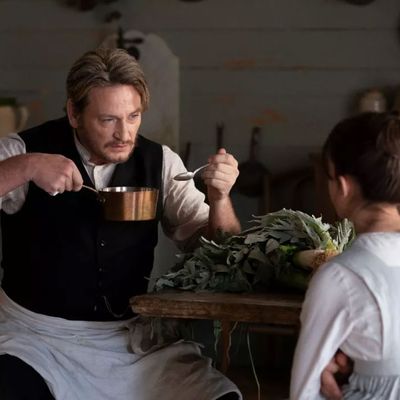The French Vietnamese director, Tran Anh Hung, made his feature debut in 1993 with The Scent of Green Papaya,

The movie benefits from the strong chemistry between stars Binoche and Magimel, who were married once, but haven’t worked together in years.
Then there are all the delectable dishes, conceived by master chef Pierre Gagnaire and prepared for the production by Michel Nave.
The Taste of Things begins with a lengthy sequence of one elaborate meal being prepared and consumed. The root vegetables being pulled out of the earth, the fish gutted, the butter clarified, the meat seared, the steaming vats of sauces and stocks lifted and stirred and drained.
The activity in the downstairs kitchen, overseen by master cook Eugénie (Juliette Binoche), runs parallel to the conversation upstairs among the master of the house Dodin Bouffant (Benoît Magimel) and his friends.
The exquisite meal kicks off this exquisite picture, placing it in the pantheon of great food movies like Babette’s Feast, Tampopo, and Big Night.
Hung’s camera focuses on the food, and the role it plays in the lives f the characters whose lives revolve around food.
Dodin, known as the “Napoleon of gastronomy,” is a fictional creation, though he’s apparently based on a real 18th-century gastronome, Jean Anthelme Brillat-Savarin.
Hung hasn’t so much adapted Marcel Rouff’s’s 1924 novel The Passionate Epicure as given it a prologue; the film ends where the book begins.
Eugénie has spent her life perfecting her craft, and her sole attention is the food, even though she is also Dodin’s lover.
Dodin and his friends are all men, and Eugénie is a woman working in a kitchen with other women–a comment on gender relations in 19th-century France, as the story is set around 1889.
But Dodin wishes that Eugénie join them at the table, though she prefers to stay in the kitchen and taste everything. “We eat everything you eat,” she tells the men.
For Dodin and Eugénie, food is a skill, an art, and art, and an emotional asset. Through it they express their desires and loves.
Dodin has been trying to convince Eugénie to marry him, but she has devoted herself to the culinary arts; she fears that becoming a wife would mean being seen as a cook, which would rob her of her identity.
By focusing on her labor and showing the control she has over Dodin with it, Hung moves the power dynamics from the upstairs dining rooms and bedrooms to the kitchen downstairs, where everything happens.
It becomes clear that it is Eugénie who is the true master of the house’ without her, Dodin is lost.
People come from continents away to partake of these meals and invite Dodin and his household to cook-offs.
Hung sets up climaxes that don’t quite occur, stretching and bending time; there is no conventional logic to the story’s progression.
Ultimately, The Taste of Things is not just a formally elegant, romantic period film about food, as might be expected, but a meditation on broader issues through the obsession with food,










